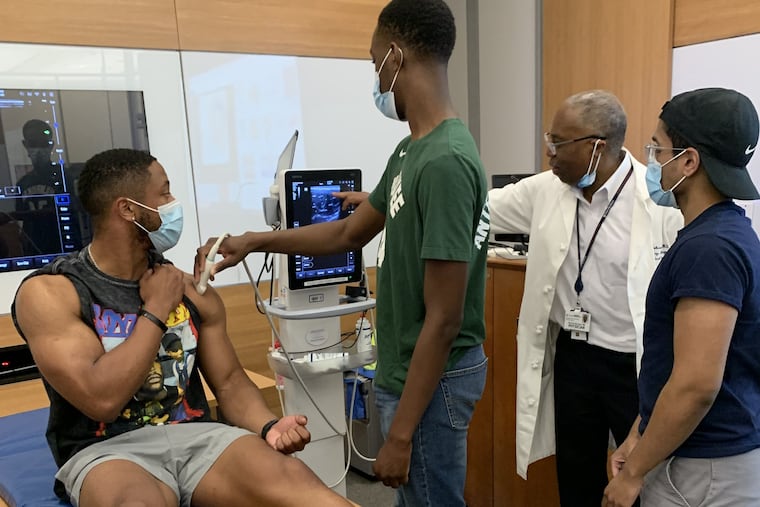Philadelphia’s College of Physicians starts mentorship program for young Black men who want to become doctors
The College of Physicians of Philadelphia wants more young Black men to become doctors.

Dennis Mashindi was one of only two Black men in the science classes that he took in college in Kentucky. The two students pushed each other to go on to graduate school.
When he started a master’s program in public health at the University of Pennsylvania in 2021, he sat in lecture halls with 80 to 130 peers, where he saw few other Black men.
Now Mashindi, who was born in Zimbabwe and lives in South Philadelphia, is leading a local effort to change statistics showing that white males are far more likely to obtain medical degrees than their Black counterparts. The College of Physicians of Philadelphia recently created a new mentorship program to nurture young Black men who want to pursue careers in medicine.
» READ MORE: Why aren’t more Philly students attending these five city universities?
The program, offered at no cost in partnership with Penn’s Perelman School of Medicine, seeks to enroll eight to 12 Philadelphia high school seniors and incoming college freshmen for its inaugural cohort this fall.
Called the Hinkson Holloway Mentorship Program, it will provide participants with a direct stipend, networking events, mentoring by Black male doctors and medical students, leadership training, test prep, seminars, and a space to come together and support one another.
“College is hard. Sometimes it just takes somebody to tell you that you can and you will make it,” said Mashindi, 23, who will serve as the program’s coordinator. “The idea is to put Black men in a space where they can be vulnerable and feel empowered and be part of a cheer circle to find motivation and be a source of motivation.”
Lacking diversity in medicine
The program is named after two prominent Philadelphia doctors — DeHaven Hinkson and Edward E. Holloway, who broke racial barriers to become the college’s first Black fellows. Founded in 1787, the College of Physicians didn’t admit Hinkson or Holloway until 1952. Though they are no longer living, both graduated from Central High School in the city’s Logan neighborhood.
“While diversity in America’s medical field is improving, Black men are still underrepresented among physicians and other medical professionals,” said Jacqui Bowman, the college’s director of the Center for Education.
» READ MORE: Why parents are choosing Black-led charter schools | Opinion
Roughly 14% of the nation’s population identifies as Black or African American, but Black men currently make up fewer than 3% of doctors nationwide, according to the Association of American Medical Colleges, a nonprofit based in Washington. The proportion of Black male doctors hasn’t changed much since the 1970s.
The lack of diversity is even more glaring in Philadelphia, where nearly 44% of residents are Black or African American.
“There’s a huge disconnect,” Mashindi said, noting that the city’s Black residents were particularly hard-hit by the pandemic, shouldering a disproportionate rate of deaths. “There’s a huge distrust between the Black community and the medical community and that probably got a little worse after COVID.”
The program, which aims to serve as a pipeline for new Black male doctors in Philadelphia, is funded by college fellow and pediatrician Steven Handler and his wife, Cynthia Solot, both longtime employees at Children’s Hospital of Philadelphia. Handler said he understands why some patients may feel more comfortable being treated by a doctor who shares their background and identity. That comfort level can lead to better health outcomes, he said.
The deadline is March 31 to submit an application for the program.